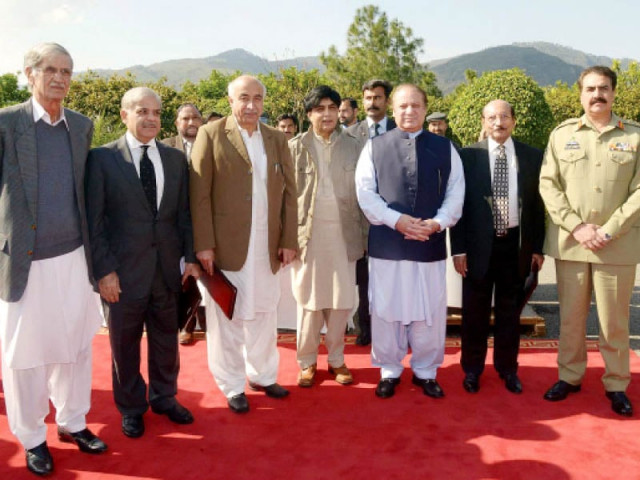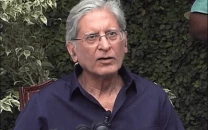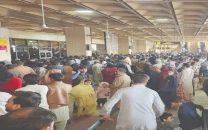Tackling security threats: Govt moves to pool intelligence resources
PM approves joint intelligence directorate and rapid response force.

Prime Minister Nawaz Sharif is flanked by army chief Gen Raheel Sharif and the four provincial chief ministers. PHOTO: NNI
Prime Minister Nawaz Sharif on Tuesday approved the establishment of a joint intelligence directorate and a rapid response force in an effort to revamp existing mechanisms to deal with security threats.
The approval was given at a top civil-military meeting chaired by the prime minister, officials said. All four chief ministers, provincial police chiefs and chief secretaries were present along with the federal ministers for defence, interior and finance.
From the military side, Chief of Army Staff General Raheel Sharif, Chief of General Staff Lt Gen Ashfaq Nadeem, ISI chief Lt Gen Zaheerul Islam and DGMO Maj Gen Amir Riaz took part in the meeting.
The meeting reviewed the current security situation with particular emphasis on the National Security Policy that seeks to put an end to years of bloody violence in the country.
The proposed joint intelligence directorate, which will work under the National Counter-Terrorism Authority (NACTA), is being set up for coordination and intelligence-sharing among 26 spy agencies, said an official familiar with the policy.
The directorate will provide all sorts of information regarding terrorist activities to the provinces.
Another key decision taken at the meeting was the establishment of a rapid response force to deal with incidents of terrorism. The force, comprising quality and trained manpower, would be supported by an air wing to respond to acts of terrorism within minutes. The force would be replicated in the provinces.
Interior Minister Chaudhry Nisar Ali Khan told reporters following the meeting that the Joint Intelligence Directorate would work round-the-clock to translate thousands of excerpts of chatter, generated every day, into actionable intelligence.
He insisted that civil and political leaderships were on the ‘same page’ on the issue of national security. He said the political and military leaderships held ‘detailed discussions’ on the internal security policy. More such meetings are expected in the coming days to fine-tune the new policy, he added.
After the meeting, the prime minister handed over bomb disposal response vehicles (BDRV) to the chief ministers of all four provinces. The vehicles are equipped with the latest technology to defuse the bombs and improvised explosive devices (IEDs).
The interior minister said it is the first time in several years that any equipment will be handed over to the provinces to combat terrorism.
He added that successive governments showed criminal negligence during the last 13 years due to which the law and order situation deteriorated.
Some 65 bomb disposal vehicles are to be handed over to the provinces in the coming months, the minister said, adding in the past, bomb disposal squad officials were defusing bombs manually.
Briefing on peace talks with Taliban
The meeting was also briefed about government efforts to strike a peace deal with the Tehreek-e-Taliban Pakistan (TTP) and its affiliates.
According to officials, the prime minister reiterated the government’s resolve to continue the peace process with the Taliban within the constitutional framework.
He voiced satisfaction over the progress achieved so far in the peace efforts. However, the prime minister urged the TTP to act against groups which were trying to sabotage the dialogue process.
Published in The Express Tribune, March 19th, 2014.



















COMMENTS
Comments are moderated and generally will be posted if they are on-topic and not abusive.
For more information, please see our Comments FAQ